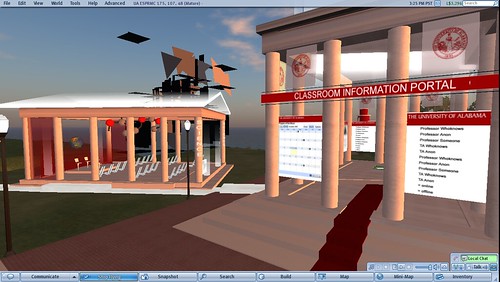
Photo Credit: StevenW Bohm (flickr)
As a student growing up through the public school system in between the mid 80's and 90's, I would have never imagined that there would be a time when students would be sitting in a classroom via the web. It's fascinating, but frightening at the same time to think that education today can be received through virtual learning. Students are no longer being kicked out of the classroom because of classroom behavioral issues, rather, they are going to the classroom on their own terms. The question then becomes, "How effective then is virtual schooling and online education?"
So, what would be some of the advantages of receiving an online education.With the fast growing pace of new information on the internet, new knowledge is readily accessible for many teachers who sometimes find it very difficult to find the time to search for information in other places such as books, newspapers, and articles, or even the library for that matter. All of these avenues can be accessed at the web as well. Therefore, teachers are finding it much more effective to gather information, activities, and other resources for their students to engage in. Educators are also finding it a lot easier to store and file information as opposed to paper filing and note keeping. Not only are teachers benefiting from distance learning, but schools seem to be getting a piece of the pie as well, especially in the area of finances. Schools that offer more online learning seem to have a better handle of their school budget. (Maloy, O'Loughlin, Edwards, & Woolf, 2014)
If there are advantages for virtual schooling, then certainly there are disadvantages that follow. I can remember taking some classes online for the first time about three years ago. As a novice of new technologies, I had my skepticism about virtual learning. Thankfully, my first try was a success, but not without much trial and error. One of the biggest complexities of online learning is that your communication is digital and electronic. There are no physical faces to look at or audible voices to answer your questions. Sometimes this can make your learning seem like a solo experience although you have other classmates and an instructor. "If a student needs face-to-face interaction with the professor in order to successfully learn an academic subject, he will not do well with online schooling." (Solis, par.3, 2014)
Tech Tool 6.1: Portaportal (www.portaportal.com)
Portaportal is a web based bookmarking tool that allows teachers to focus on specific webpages for learning resources. For an example, ABCya is an educational website designed for kids K-5 featuring games and apps for teaching students numbers, letters, shapes, etc. This web page can be used to carry a favorite page from a personal computer to other computers that will be using the same information.
Resources:
Maloy, R.W., O'Loughlin, R.E.V., Edwards, S.A., & Woolf, B.P. (2014) Transforming Learning With New Technologies, Boston, Massachuettes: Pearson
Solis, K.T., (2014) What are the Disadvantages of Online Schooling? WiseGeek, Retrieved 19 Feb 2014, Web 2 Feb 2014
